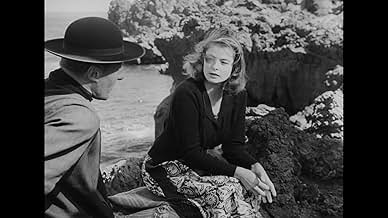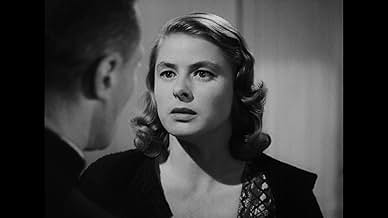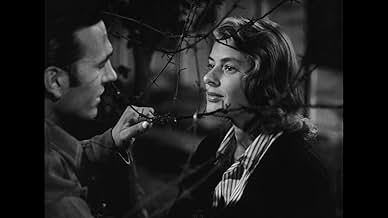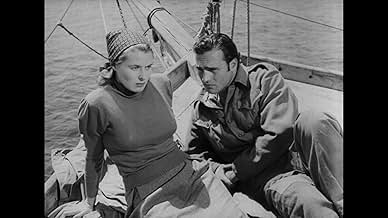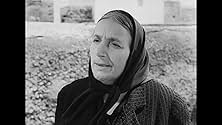NOTE IMDb
7,2/10
8,5 k
MA NOTE
Karen, une jeune femme de la Baltique, épouse Antonio, un pêcheur pour échapper à un camp de prisonniers, mais la vie dans le village d'Antonio, Stromboli, menacé par le volcan, est difficil... Tout lireKaren, une jeune femme de la Baltique, épouse Antonio, un pêcheur pour échapper à un camp de prisonniers, mais la vie dans le village d'Antonio, Stromboli, menacé par le volcan, est difficile et Karen ne parvient pas à s'y faire.Karen, une jeune femme de la Baltique, épouse Antonio, un pêcheur pour échapper à un camp de prisonniers, mais la vie dans le village d'Antonio, Stromboli, menacé par le volcan, est difficile et Karen ne parvient pas à s'y faire.
- Réalisation
- Scénario
- Casting principal
- Récompenses
- 2 victoires et 1 nomination au total
Avis à la une
Other recent commentaries on this film call it a "masterpiece". I strongly disagree. When it opened the reviews were as bleak and indifferent to it as Karen (Ingrid Bergman) is to the island of Stromboli. No one considered it up to Rossellini's "Open City" or "Paisan" in terms of genuine artifice. It was termed bleak and undistinguished with a plodding script that could only be called simplistic in terms of dialogue.
Fine B&W cinematography of a desolate island and scenes of an actual volcano eruption are not enough to make a 107-minute movie tailored to demonstrate the neo-realism of Ingrid Bergman's acting now that she had shed her Hollywood glamour. Bergman is ill served by a poorly developed character and embarrassingly inept scenes between her and her Italian fisherman husband (Mario Vitale).
There is startling realism in the tuna fishing sequence and harsh realism in the desolate landscape and close-ups of island people, but Rossellini did not seem to have a well developed or finished script in mind when he began shooting what others have called a "masterpiece". There is no doubt that had he the advantage of a well structured and conceived screenplay he might have been effective in telling this kind of story. But with the camera lingering on an anguished Ingrid Bergman sobbing in scene after scene of emotional isolation, the viewer is left with the feeling that this is little more than a post-war documentary in search of a coherent plot.
The unresolved ending used in the U.S. print is not the original ending, by the way, and leaves the viewer with the feeling he has witnessed an unfinished screenplay. It is said that Rossellini began shooting without a complete script on a day to day basis that must have been a strain on Bergman. It shows when he spends an inordinate amount of time on a fishing sequence that has little to do with furthering the slight plot. Too bad he didn't start the project with a finished script and a firm focus for his content.
The background music is oddly silent during some of the most emotional moments and despite Italian chants of fishermen the soundtrack remains mostly barren of any interesting content.
Fine B&W cinematography of a desolate island and scenes of an actual volcano eruption are not enough to make a 107-minute movie tailored to demonstrate the neo-realism of Ingrid Bergman's acting now that she had shed her Hollywood glamour. Bergman is ill served by a poorly developed character and embarrassingly inept scenes between her and her Italian fisherman husband (Mario Vitale).
There is startling realism in the tuna fishing sequence and harsh realism in the desolate landscape and close-ups of island people, but Rossellini did not seem to have a well developed or finished script in mind when he began shooting what others have called a "masterpiece". There is no doubt that had he the advantage of a well structured and conceived screenplay he might have been effective in telling this kind of story. But with the camera lingering on an anguished Ingrid Bergman sobbing in scene after scene of emotional isolation, the viewer is left with the feeling that this is little more than a post-war documentary in search of a coherent plot.
The unresolved ending used in the U.S. print is not the original ending, by the way, and leaves the viewer with the feeling he has witnessed an unfinished screenplay. It is said that Rossellini began shooting without a complete script on a day to day basis that must have been a strain on Bergman. It shows when he spends an inordinate amount of time on a fishing sequence that has little to do with furthering the slight plot. Too bad he didn't start the project with a finished script and a firm focus for his content.
The background music is oddly silent during some of the most emotional moments and despite Italian chants of fishermen the soundtrack remains mostly barren of any interesting content.
"La terra e dura qui." Ingrid Bergman is a powerhouse in this film (perhaps out of love and devotion to the director), but she still can't match the power of the menacing volcano on this remote island off the coast of Italy. Bergman plays a prisoner of war with a checkered past stuck in a women's camp, who marries a Strombolian in order to provide herself with the security she needs. Trouble awaits her, and the first sign we get of that is when she starts to complain of being cold on the boat that is taking her to her new life. What she finds is not up to her high Continental standards, and her attitudes towards the locals and the place itself diminish her already low stature as an outsider. It is less the people however, than the general character of the place that turns her off. The volcano, unnamed by the villagers, always awaits in the background, and setting itself becomes one of the main characters (thus the importance of the title), a force to be reckoned with, much like her character.
Although this film is not noir in any way, and Rossellini himself would probably turn in his grave for hearing me say this, Bergman's character certainly does not hesitate in using her female "wiles" to get what she wants and needs. She survived a world war on what we take are wits and flexible morals, so she will also make it through this and I love her for it.
She even attempts to seduce the local priest by cooing "I knew you were the only person who could help me." Having that attempt fail, she tries with the village lighthouse keeper seen at right, and I don't even have to explain the power of her touch. As she asks for help to escape from the village, she softly touches his foot with hers, and creates an unbelievably palpable feeling of erotic energy, something unheard of in mainstream movies today. I know, that's such a cliché, but it's true.
Anyway, I won't discuss the ending, which angered me as a modern woman (even Bergman didn't seem to be buying it), but I will say that the film impressed me with its use of setting comprising plot, character, mise-en-scene, and theme. The film IS setting. It's also worth it just to see the non-actors performing a yearly tuna fishing ritual that dates back to the Phoenecians. Rossellini films are never just stories, they are historical documents. And I love him for that.
cococravescinema.blogspot.com
Although this film is not noir in any way, and Rossellini himself would probably turn in his grave for hearing me say this, Bergman's character certainly does not hesitate in using her female "wiles" to get what she wants and needs. She survived a world war on what we take are wits and flexible morals, so she will also make it through this and I love her for it.
She even attempts to seduce the local priest by cooing "I knew you were the only person who could help me." Having that attempt fail, she tries with the village lighthouse keeper seen at right, and I don't even have to explain the power of her touch. As she asks for help to escape from the village, she softly touches his foot with hers, and creates an unbelievably palpable feeling of erotic energy, something unheard of in mainstream movies today. I know, that's such a cliché, but it's true.
Anyway, I won't discuss the ending, which angered me as a modern woman (even Bergman didn't seem to be buying it), but I will say that the film impressed me with its use of setting comprising plot, character, mise-en-scene, and theme. The film IS setting. It's also worth it just to see the non-actors performing a yearly tuna fishing ritual that dates back to the Phoenecians. Rossellini films are never just stories, they are historical documents. And I love him for that.
cococravescinema.blogspot.com
I must confess that I don't belong to those who consider this movie a big masterpiece. The main problem is Ingrid Bergman and her role. Somehow I found it hard to believe that a woman who seems to be reasonably urbane and worldly-wise, or at least streetwise, and who seems to have weathered difficult situations during a World War in comparative comfort would follow an illiterate peasant to a dead end island. She has many scenes on her own in which she I can't describe it differently throws tantrums and feels sorry for herself. It just becomes a boring routine after a while and a little ridiculous as well. There is no character development whatsoever. I liked Bergman much more in movies like Notorious or Gaslight were she probably received better direction.
However, the fantastic locations more than compensate for those flaws. The island of Stromboli is nothing more than an active volcano. The main characters live on the edge between the sea and the towering crater. All important movements in this movie are vertical. The messages from hell fall out of the sky in the form of burning rocks or lower themselves over the heads of people as poisonous gases. A contrary movement up from the bottom - is the awesome fishing expedition for me the most unforgettable event of the movie. Large teams of fishermen haul in a huge net, singing. Gradually the surface of the water over the net starts getting agitated until at last huge fish (tuna, I guess) start emerging in a wild frenzy and are hauled aboard. This is perfectly filmed an edited and simply horrific.
All the elements come together and leave little action space for the cornered humans. The movie proposes two solutions: emigration or religion. The priest of the island plays a pivotal role in the story as he represents the link between the two options. However his actions seemed to me pretty inconclusive, at first he expresses himself overly optimistic, in an almost derisory way, as to the functionality of the ill fitted marriage of the heroine, then he declares himself incapable of helping the heroine, throwing her back onto herself in matters of religious belief. Eventually he comes through as the chief guardian of the dead buried on the island that is a kind of gateway to the world beyond. This is all interesting stuff, but it is not handled with particular care or discipline, which is a pity.
However, the fantastic locations more than compensate for those flaws. The island of Stromboli is nothing more than an active volcano. The main characters live on the edge between the sea and the towering crater. All important movements in this movie are vertical. The messages from hell fall out of the sky in the form of burning rocks or lower themselves over the heads of people as poisonous gases. A contrary movement up from the bottom - is the awesome fishing expedition for me the most unforgettable event of the movie. Large teams of fishermen haul in a huge net, singing. Gradually the surface of the water over the net starts getting agitated until at last huge fish (tuna, I guess) start emerging in a wild frenzy and are hauled aboard. This is perfectly filmed an edited and simply horrific.
All the elements come together and leave little action space for the cornered humans. The movie proposes two solutions: emigration or religion. The priest of the island plays a pivotal role in the story as he represents the link between the two options. However his actions seemed to me pretty inconclusive, at first he expresses himself overly optimistic, in an almost derisory way, as to the functionality of the ill fitted marriage of the heroine, then he declares himself incapable of helping the heroine, throwing her back onto herself in matters of religious belief. Eventually he comes through as the chief guardian of the dead buried on the island that is a kind of gateway to the world beyond. This is all interesting stuff, but it is not handled with particular care or discipline, which is a pity.
I enjoyed reading "erupting beauty" (The Big Combo, 2 February 2004) for a good summary of Stromboli. Zetes ("A vastly underrated masterpiece", zetes from Saint Paul, MN, 15 June 2002) and bkoganbing ("Ingrid and the volcano", bkoganbing from Buffalo, New York, 29 August 2012) both include good background about the controversies surrounding it. Cogs ("Poor old Ingrid!!", cogs from London, England, 2 February 2005) sees similarities between Rossellini and Bresson that I share. I agree with Cogs that Bresson is more interesting.
Stromboli is a showcase for Ingrid Bergman, who to my mind is easily the greatest actress in cinema. Karen's situation is Hellish. She marries to escape an Italian interment camp. She subsequently finds only misery with the desolate volcano-island that her fisherman-husband takes her to. The terrain is harsh and the locals are even worse. She discovers him to be overly simple and occasionally too beastly to bear. The finale reflects her desire for just a meager amount of happiness in such a world as this.
Visually Roberto Rossellini is superb. His visual aesthetics are unsentimental but never boring. His camera work is unobtrusive.
Two of the most memorable scenes feature a disturbing quotient of animal cruelty. In the first scene, a live rabbit is needlessly sacrificed by being placed near a ferret. Rossellini couldn't use stuffed animals. He has the audience, some of whom are animal lovers, suffer by showing the kill in detail. Of course, Rossellini is strengthening the distance between Ingrid and her fisherman husband, and identifying her with the suffering rabbit. However, I won't give Rossellini any credit for moving the story along with this thoughtless tactic.
The second scene is the justifiably famous tuna slaughter with real fisherman, nets and spears. I have eaten tuna all my life and haven't thought much where it comes from. Also, I have no doubt that all of the tuna that we see being harvested was ultimately eaten. To give Rossellini credit, he filmed it well--with Ingrid nearby witnessing it as if she was one of the unfortunate fish. I just don't think that it takes great storytelling skill to rely on animal slaughter to move an audience.
Two other scenes that are noteworthy is when Karen attempts to seduce a priest, and when she (apparently) seduces a lighthouse keeper. The character that Rosselini and Bergman are portraying is flawed, and very human. She's no saint, she's a woman with unfulfilled needs.
Overall, Stromboli is a must-see member of the Italian neo-realism canon. Very few films venture to depict life without false pretenses. Ingrid's Karen really suffers; and her actions make her a polarizing figure to viewers, isolating her further. Rossellini and Bergman are showing what life is really like as every member of the audience understands it.
Stromboli is a showcase for Ingrid Bergman, who to my mind is easily the greatest actress in cinema. Karen's situation is Hellish. She marries to escape an Italian interment camp. She subsequently finds only misery with the desolate volcano-island that her fisherman-husband takes her to. The terrain is harsh and the locals are even worse. She discovers him to be overly simple and occasionally too beastly to bear. The finale reflects her desire for just a meager amount of happiness in such a world as this.
Visually Roberto Rossellini is superb. His visual aesthetics are unsentimental but never boring. His camera work is unobtrusive.
Two of the most memorable scenes feature a disturbing quotient of animal cruelty. In the first scene, a live rabbit is needlessly sacrificed by being placed near a ferret. Rossellini couldn't use stuffed animals. He has the audience, some of whom are animal lovers, suffer by showing the kill in detail. Of course, Rossellini is strengthening the distance between Ingrid and her fisherman husband, and identifying her with the suffering rabbit. However, I won't give Rossellini any credit for moving the story along with this thoughtless tactic.
The second scene is the justifiably famous tuna slaughter with real fisherman, nets and spears. I have eaten tuna all my life and haven't thought much where it comes from. Also, I have no doubt that all of the tuna that we see being harvested was ultimately eaten. To give Rossellini credit, he filmed it well--with Ingrid nearby witnessing it as if she was one of the unfortunate fish. I just don't think that it takes great storytelling skill to rely on animal slaughter to move an audience.
Two other scenes that are noteworthy is when Karen attempts to seduce a priest, and when she (apparently) seduces a lighthouse keeper. The character that Rosselini and Bergman are portraying is flawed, and very human. She's no saint, she's a woman with unfulfilled needs.
Overall, Stromboli is a must-see member of the Italian neo-realism canon. Very few films venture to depict life without false pretenses. Ingrid's Karen really suffers; and her actions make her a polarizing figure to viewers, isolating her further. Rossellini and Bergman are showing what life is really like as every member of the audience understands it.
Rossellini's "Stromboli, terra di Dio" is a film on the line between fiction and reality more than usual for the acclaimed director. Most of the central part, where Karin just lives in Stromboli and complains about stuff was not written as in a normal screenplay: Rossellini chose possible elements of the environment or popular habits and filmed them in the movie, putting Karen in it like an extrernal observator. This has a double effect: neorealism comes to some of its highest achievements (like the tuna fishing and the eruption of the volcano) but to the loss of a fantastic actress such as Ingrid Bergman, who always feels out of place. Careful: I didn't say KAREN, I said BERGMAN. Because as a character she should be out of place, and she is even esthetically: she's always combed and white as the moon, while the inhabitants are rusty and dirty. But the actress herself is out of place in this film, and that is not a good thing at all. Her lines are dumb, repetitive, and Bergman actually did a great job managing to not disappear in such irrelevance. She still lives the scene, but her attempt is clearly forced into a new, uncharted territory as was Italian filmmaking for an American diva. We could say then that Ingrid is just as lost as her character.
What I just can't stand in this film is the necessity of squeezing the religious conversion (I'm talking about the Italian version of the film, American and International versions have slightly different endings for that time's commercial policies). It was the result of Rossellini's collaboration with powerful politicians and Church men, to be specific Giulio Andreotti and Felix Morlion, whose intention was to use a critically acclaimed author's cinema for political propaganda. I hate when other interests interfere with artistic purposes, and here the last moments are definitely flawed with an out of the blue realization of the power and existence of God for no good reason.
As I said before, neorealist features are what makes this film enjoyable and a classic. Apart from the brilliant scenes I mentioned above, I really liked the harsh depiction of the patriarchy that unfortunately still exists and thrives especially in the South of Italy. I actually felt bad and angry at Antonio as he jerks his wife with no respect and beats her like an animal, but I know very well that even today that is the norm in so many families and that simply pisses me off. Kudos to Rossellini for depicting that so realistically, but then again he's a great director exactly because of scenes like those.
What I just can't stand in this film is the necessity of squeezing the religious conversion (I'm talking about the Italian version of the film, American and International versions have slightly different endings for that time's commercial policies). It was the result of Rossellini's collaboration with powerful politicians and Church men, to be specific Giulio Andreotti and Felix Morlion, whose intention was to use a critically acclaimed author's cinema for political propaganda. I hate when other interests interfere with artistic purposes, and here the last moments are definitely flawed with an out of the blue realization of the power and existence of God for no good reason.
As I said before, neorealist features are what makes this film enjoyable and a classic. Apart from the brilliant scenes I mentioned above, I really liked the harsh depiction of the patriarchy that unfortunately still exists and thrives especially in the South of Italy. I actually felt bad and angry at Antonio as he jerks his wife with no respect and beats her like an animal, but I know very well that even today that is the norm in so many families and that simply pisses me off. Kudos to Rossellini for depicting that so realistically, but then again he's a great director exactly because of scenes like those.
Le saviez-vous
- AnecdotesDuring production of this film, Ingrid Bergman entered into an extra-marital affair with Roberto Rossellini and became pregnant, the two eventually getting married and having three children. The resulting scandal in America effectively blacklisted her from the North American movie market and she was even condemned by politicians and religious figures. She was finally forgiven and welcomed back to America upon the success of Anastasia (1956), but her Hollywood career was temporarily ended by this movie.
- GaffesThough used by women, pants were not so popular on that time. Is strange that a poor refugee like the character played by Bergman wears pants almost the entire movie.
- Crédits fousOpening credits: "I was found of them that sought me not; I was made manifest unto them that asked not after me." (New Testament, St. Paul's letter to the Romans, Chapter 10, Verse 20)
- Versions alternativesSeveral running times exist. The main difference between the 81 min. US version and the 105 min. Italian version was in the ending, with religious themes cut out.
- ConnexionsEdited into Histoire(s) du cinéma: Une histoire seule (1989)
Meilleurs choix
Connectez-vous pour évaluer et suivre la liste de favoris afin de recevoir des recommandations personnalisées
- How long is Stromboli?Alimenté par Alexa
Détails
- Date de sortie
- Pays d’origine
- Langues
- Aussi connu sous le nom de
- Stromboli, terre de Dieu
- Lieux de tournage
- Sociétés de production
- Voir plus de crédits d'entreprise sur IMDbPro
Box-office
- Budget
- 1 000 000 $US (estimé)
- Montant brut mondial
- 17 532 $US
- Durée1 heure 43 minutes
- Couleur
- Rapport de forme
- 1.37 : 1
Contribuer à cette page
Suggérer une modification ou ajouter du contenu manquant



